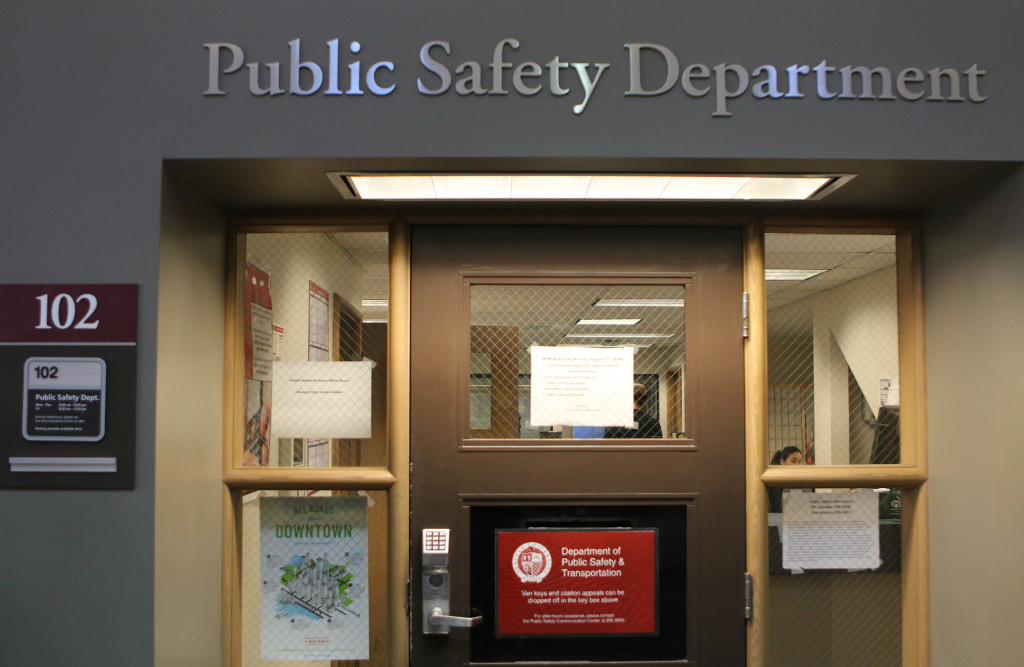Misconceptions about Public Safety at Seattle University are becoming more frequent among students.
As undergraduate students who live in residence halls receive write-ups for conduct violations—whether it’s for underage drinking, smoking marijuana, or otherwise—sometimes they feel that Public Safety is out to get them.
Liam Barker, a freshman living in Campion, feels that the priorities of Public Safety are not always where they should be.
“I usually don’t see Public Safety walking around the places where I think I would be robbed,” Barker said. “They walk around on campus, but I feel like they don’t check much of the perimeter. They don’t let people come in to campus, but once students get outside of campus, there is no protection from P-Safe, which is a problem.”
The duty of Public Safety to keep students out of harm’s way becomes blurred when they have to fix their attention on conduct violations.
This is a feeling that Tim Marron, the Executive Director of Public Safety and Transportation at Seattle U, wants to clear up.
“Our responsibility, and requirement, is to report conduct violations. That’s one thing that needs to be clarified,” according to Marron.
Public Safety officers are not meant to look for student conduct, but instead observe and report any violations that they witness. Along with Resident Directors and the resident assistants they oversee, Public Safety officers have the same authority as faculty members and permanent staff members.
When a student gets in trouble in the residence halls, the role that Public Safety plays in their write-up can cause students to blame Public Safety for their misfortune and make them feel that those there to protects us are, in fact, overbearing. When a student is suspected of violating their housing agreement—often times for alcohol use—an RD or RA will call Public Safety to inspect the person’s room. Because “P-Safe” officers do the inspections, students feel that they are the ones enforcing the policy, when in fact, the dean of students is the one who writes policies on campus. Public Safety officers are required to come to the scene to make sure students are safe—or, in other words, to enforce the policy administered from above.
But the feeling that Barker shares among his classmates is that when Public Safety is required to deal with a student violating policy, they are missing out on their sole purpose: to protect the lives the students.
“There aren’t that many P-Safe officers, so if there are four or five focusing on one person, there could be other more violent things going on around campus,” Barker said.
Marron agrees, and explained that every time one of his officers is required to go into the dorms, their active role on campus takes a backseat.
“If officers are focused on student conduct, then who is looking out for violent crime threats to the community?” Marron said.
A balance between enforcing residence halls documentation policies and actively patrolling the campus is what students like Barker would like to see.
Resident assistants monitor hallways, but Public Safety only actively patrols lobbies and entryways of residence halls. This means that each sector of campus has its own officer assigned to it—the central goal being to prevent harm to students.
Marron was adamant to stress the importance for students to recognize that officers such as himself are on campus to ensure the safety of students, and when they are needed inside a residence hall, they aren’t providing the potentially more pressing authority that their job requires of them.
“Every time a Public Safety officer has to be in the hall … they are in a way effecting the safety of the university. That’s an officer dealing with an alcohol or marijuana issue [inside the dorms], when they should be out on patrol,” Marron said.
The professionalism and skill that Public Safety officers possess is what allows them to keep students safe. For example, Public Safety helped a student who was stabbed get to Harborview Medical Center last year.
Seattle U Public Safety has also been adapting to the logistics of protecting a campus in a high crime neighborhood, including training to halt violent intruders. Over the past two years, officers were subjected to random drills while on duty that trained them to best deal with a threat on campus. Marron said that his officers responded very meticulously to the training they completed, which involved the officers having to report to a random area and best seek out methods to resolve any conflicts.
“They took this practice more diligently than I’ve seen in even law enforcement,” Marron said.
Chaucer may be reached at [email protected]














Tim Marron
Feb 27, 2015 at 10:33 am
“Public Safety officers are required to come to the scene to make sure students are safe—or, in other words, to enforce the policy administered from above.”
Just to clarify, as had been stated in the recorded interview, DPS officers do NOT enforce policy, they report policy violations, as do other members of the university staff and faculty. The Dean of Students or designee enforces policy violations by issuing sanctions or other corrective measures. The primary mission of DPS officers is to protect the lives of Seattle University community members.
To reemphasize what was stated in the article, DPS Officers do not patrol Residence Hall living areas for policy violations. DPS Officers respond when called by students or HRL staff to assist. When a student chooses to commit a policy violation and HRL calls an officer to assist, that officer’s sector remains unwatched. For violations in Campion/Chardin, this impacts the safety of the university perimeter along Jefferson.
Also, the officer pictured in this article is Asst. Supervisor Steve Saylor, a long time, valued member of the Seattle University community.